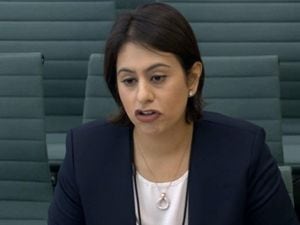Unemployment brought on by pandemic could breed extremism, MPs warned
Sara Khan was addressing the Commons Home Affairs Committee.

The looming financial crisis brought on by the coronavirus pandemic will be “very conducive” to breeding extremism, MPs have heard.
Sara Khan, who leads the Commission for Countering Extremism, said “huge unemployment rates” and councils having to make “massive cuts” coupled with “soaring” hate crime and growing violence is a “climate” which extremists could exploit.
Her warnings followed a report in July by the Commission which concluded extremists had “fully exploited” the coronavirus pandemic to “breed hate” through “dangerous conspiracy theories”.
Speaking to the Commons Home Affairs Committee on Wednesday, she said: “If we see what’s coming down the pipeline now as a country, we know there are going to be huge unemployment rates, we know that local authorities are going to have to make massive cuts because they are going to be experiencing financial black holes, we are seeing increasing rates of violence, soaring hate crime rates – that condition and that kind of climate is going to be very conducive for extremists and for extremism.
“And from what we’ve seen throughout history is that type of climate will be very conducive and extremists will seek to exploit that.
“And the question we have to ask ourselves is, ‘do we have the resource and the strategy to be able to deal with that?’, because we know that is coming down the pipeline.”
She also said the amount of “young people espousing extremist views and also racist views has been quite alarming”, adding: “A lot of this information is anecdotal but there is clearly a problem felt among many teachers that more and more young people are promoting and holding racist, extremist and anti-women views.”
Later in the session, Metropolitan Police assistant commissioner Neil Basu, the head of counter terrorism policing, also expressed his concerns about the rise in extremism, telling the committee: “The amplification of extremism and its ability to incite a vulnerable section of the population towards terrorism is probably my greatest single fear.”
Ms Khan said extremists have “professionalised” and “intellectualised their hate”, now operating at a local, national and international level.
Reiterating calls for the Government to urgently commit to tackling extremism, she told the committee the country was currently lacking an effective policy.
She said: “It’s weak, it’s disjointed, it’s behind the curve, it’s not operational and that has to fundamentally change if we are now going to deal with this huge growing problem of extremism.”
Despite delays in the Government formally responding to recommendations she has made to address the problem, Ms Khan said: “I do believe the Government does care about this issue.”
But while getting the policy right will take time, she said daily problems also have to be addressed.
The phrase extremism is “regularly misused by politicians, political parties and all sorts of people for all sorts of reasons”, she said, warning that the behaviour was harming “democracy, the rights of minorities” and creating a “culture of censorship”.
In the past, green activists have wrongfully been labelled as extremists, she said, adding: “I do not consider Extinction Rebellion to be an extremism group.”
She previously recommended the Home Secretary Priti Patel launch and lead a taskforce addressing the problem.
Chairman Yvette Cooper said on June 15 that Ms Patel told the committee work was taking place “and has been for some time”.
But Ms Khan responded: “I’m not aware of any work on the taskforce. There’s no work happening as far as I’m aware on the taskforce,” adding that she last spoke to Ms Patel on the matter on Tuesday.
Earlier this year, Ms Khan launched a legal review over concerns there were gaps in the law which allow extremists to push their agenda and sow divisions.
The former head of counter-terrorism, Sir Mark Rowley, is leading the inquiry which will examine whether existing legislation adequately addresses “hateful extremism”.
In a report published in October last year, she established the phrase to describe a category of extremist behaviour which aimed to incite hatred and make a moral justification for violence, but does not count as terrorism.





